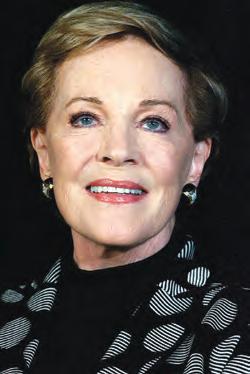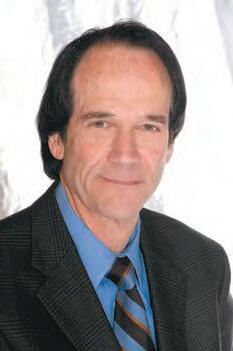
8 minute read
A Thrilling Adventure
ARTS&LIFE
BOOK REVIEW
Advertisement
A Thrilling Adventure
Shock Wave by Al Pessin, Pinnacle Books: New York, 2022.
Al Pessin
Adeadly plot is being hatched by terrorists in the Middle East, planned by America’s most hunted terrorist. Luckily, word has leaked to the Americans. One of its elite counter-terrorist units decides to act and assigns its top undercover agent to foil the operation. He joins the terrorist group that is planning a spectacular attack, and so begins the thrilling adventure in Shock Wave, a new book by Al Pessin.
Born and raised in Oak Park, Pessin owns an extremely impressive resume as an award-winning journalist and author. For 39 years, he was foreign correspondent for the Voice of America and a member of the White House Press Corps in the 1990s. Along the way, Pessin reported from Hong Kong, Islamabad, Beijing, Jerusalem and London.
While covering the news in the People’s Republic of China, Pessin was expelled for “illegal news gathering” and “fomenting counter-revolutionary rebellion,” after the Tiananmen Massacre in 1989. In China, it appears that the truth hurts. This story was reported by the JN (July 28, 1989).
Following tried-and-true advice about the art of writing, it can be said that Pessin indeed writes about what he knows. Shock Wave is the third book in his Task Force Epsilon series. The first two, Sand Blast and Blowback are set in Afghanistan and Syria, respectively.
In Shock Wave, Faraz Abdallah, one of America’s best undercover operatives, is again asked to foil an evil plot. Like many fictional heroes, he learned his exceptional skills in the U.S. Army, but rather uniquely, he is an Afghan American soldier. Likewise, his boss is a woman, Bridget Davenport. A West Point graduate, Davenport now heads a secretive unit that has a singular mission: fight global terrorism.
Abdallah and Davenport make a formidable team, and they need to be one. They must find America’s most-want- ed terrorist, Saddiq Mohammed al-Assali, who is planning a devastating attack in Jerusalem, timed for a day when Israelis are celebrating a major holiday. The setting for the story is the West Bank and Israel.
The story begins with al-Assali in a boat on the Red Sea, traveling clandestinely to meet terrorists in-training. His recent plots have not gone well and he desperately a needs a huge, visible success to maintain his status … or just stay alive. But, al-Assali has an idea that, if successful, will involve the United States in a Middle Eastern war.
The Americans, however, have lost track of al-Assali. They are alarmed and turn to Davenport’s covert unit. She, in turn, recruits Abdallah for the job of infiltrating the terrorist organization. Abdallah had hoped to return to regular Army life with the 101st Airborne, but the stakes are immense and his country needs him. The Americans will also need the skills and experience of Israeli intelligence.
While the concept of an attack on a holiday is not new — the 1973 Yom Kippur War, for one example — Pessin’s story is a fresh take on the idea. And his years of experience reporting from some of the world’s most troubled areas contribute to the development of the story’s primary
characters. Son of immigrants and a patriot, Abdallah’s background as an AfghanAmerican allows him to deftly assume a new identity and infiltrate al-Assali’s organization. As he works to sabotage the plot, MIKE SMITH Contributing Abdallah meets a range of Islamic terrorists — extreme religious idealogues,
Writer antisemitic, anti-Israel terrorists, and family members forced to harbor the plotters — all with their own personal backgrounds and reasons for their willingness to participate in and die for a terrorist operation. If successful, it will result in a cruel mass slaughter of Israelis, tourists and others on Purim in Jerusalem. Fighting against the terrorists, along with Abdallah, Davenport and the Americans are Israeli agents. They also have their personal experiences, prejudices and ideologies. The result is a well-written page-turner of an adventure in and of itself. Moreover, although fiction, the story also provides the reader with insight into the possible rationales and experiences that motivate terrorists, and likewise, the diverse nature and motivations of those fighting against them. In this sense, it is also a thoughtful book. Does Abdallah thwart the evil plan? I cannot say. It would blow my cover. Read Shockwave for the answer.

For an interview with author Al Pessin, please turn the page.
BOOK REVIEW
continued from page 49 An Interview with Shock Wave Author
MIKE SMITH CONTRIBUTING WRITER
Mike Smith: Although Shock Wave is a fictional adventure story, I found it to be informative in the sense of a realistic portrayal of the fight against terrorism in the Middle East and Israel. Are there lessons you hope readers will learn from your book?
Al Pessin: Yes. The first two lessons I learned covering the Middle East, Central Asia and the Pentagon are that the people defending Israel and America make huge sacrifices and, at the same time, no victory they achieve is ever complete. There’s always another enemy just around the corner. This is due to the false but strong lure of Islamic extremism as a pathway to religious purity, political liberation, and an end to poverty and hopelessness.
But along with that goes a third lesson: Islam is not a monolith. The villains in my books are Muslims. But so is the hero. The Palestinians and the broader Muslim population are large, diverse groups of people with disparate political and religious views, who support or oppose terrorism to varying degrees. Even the supporters and perpetrators of violence have reasons they do what they do — experiences, motivations, rationalizations.
In Shock Wave, for example, there’s a Palestinian university student who is trying to embrace the modern world while staying rooted in her jihadist family. I pride myself on creating three-dimensional villains in all my novels, whether Palestinian, Afghan or Syrian. That’s not to show or encourage support for them, but rather to see them for who they are. Without that, we have little hope of addressing the myriad factors that make terrorism so hard to stamp out.
MS: Your two main characters fighting a terrorist plot are not traditional American white, male special forces heroes. Indeed, one is an Afghan-American and his boss is a woman. How did you choose these characters? Do they have any basis in people you met while covering news and conflicts around the world?
AP: My main character, Faraz Abdallah, is an AfghanAmerican whose parents fled to the United States during the Soviet occupation of Afghanistan, much as my own grandparents fled Eastern Europe several decades earlier. Now, Faraz is a U.S. Army lieutenant conducting undercover missions to fight terrorists. Faraz would not have his unique skills and be able to accomplish the great things he does to save American lives if his parents had not been refugees. He is a fictional stand-in for the many immigrants and their children who volunteer for our armed forces and help defend us every day.
Faraz’s boss, Bridget Davenport, is a West Point grad from an American family with a tradition of military service. Although she’s a civilian now, Bridget joins Faraz in the field when he needs her most, displaying bravery, combat skills and incredible toughness. Bridget is an amalgam of the many strong, smart, talented women I met while covering the military and the civilian defense estabAl Pessin lishment. I wanted to pay homage to their often-underappreciated contribution to our security.
MS: You have an impressive and extensive resume as a global journalist. How does your experience inform your books?
AP: Living in Jerusalem as a foreign correspondent, traveling throughout Israel and the Palestinian territories, and witnessing the aftermath of terrorist attacks inspired and enabled me to write Shock Wave. My personal interactions with people across the Israeli and Palestinian political and cultural spectrums gave me a fully rounded view of the situation and form the backdrop for the book.
Many of my characters are based on people I met. Similarly, my years covering the Pentagon and traveling to the Iraq and Afghanistan war zones inform my first two novels, Sandblast and Blowback, and give them on-the-ground authenticity.
MS: You grew up in Oak Park. Did your upbringing in the Metro Detroit Jewish community have any impact upon your career and writing?
AP: For sure. B’nai Moshe, United Hebrew Schools and Camp Tamarack (K’far Ivri) played a huge role in forging my Jewish identity. I carried that with me to High Holiday services in Hong Kong, Nairobi and London and to seders in Beijing, Mumbai and a surreptitious one behind closed curtains in Islamabad. When I arrived in Israel as a journalist, I experienced a fair amount of dissonance. I found that some Israelis did not reflect the Jewish values I had learned. That was a wakeup call for me about diversity of views among Jews and provided a roadmap to help me recognize and understand diversity in other communities.
On a lighter note, my Jewish background also inspired my play Murder at the Butcher’s, a farce that had a sold-out premiere run just before the pandemic.
MS: Is there anything else you would like the readers of the Detroit Jewish News to know about your book(s)?
AP: Shock Wave stands alone as an adventure story and as my take on the IsraeliPalestinian conflict. The first two books in the series, Sandblast and Blowback, are available for readers who want to know more about the characters and their ongoing, almost impossibly difficult effort to defend America against terrorism.
There’s more about my books and the stories behind them at www.alpessin.com.










